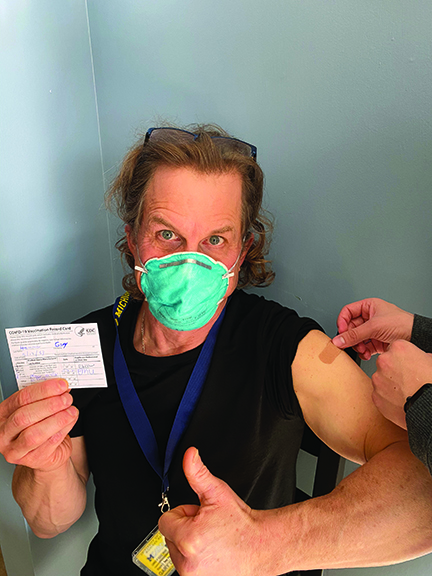
Endocrine Society president Gary D. Hammer, MD, PhD, discusses receiving the COVID-19 vaccine and why it’s imperative for endocrinologists to “stand behind the science.”
Endocrine Society president Gary D. Hammer, MD, PhD, on December 22, 2020, received the first dose of the COVID-19 vaccine and his second dose on January 12, 2021, joining a growing number of essential healthcare workers and first responders inoculating themselves from this virus so they can continue not just treating patients, but their potential life-changing and lifesaving work in the lab as well.
“It is essential for us to assure that science is a guardian of truth and decision making in our country. As a scientist, I stand behind the science, where the benefits far outweigh any of the minor risks for a vaccine. For me, the vaccine was a welcome shot in the arm.” – Gary D. Hammer, MD, PhD, president, Endocrine Society
As more people receive their vaccinations, Hammer tells Endocrine News that he sees a light at the end of this long, dark tunnel, that the clinical and research communities can move forward with this upgrade in their ability to manage COVID-19. “We can get back to some semblance of normal in terms of our global society, but also in terms of our Endocrine Society,” he says. “We can get back to the work of endocrine science and clinical care, with all of our constituent members back to feeling that they can accomplish their work more effectively.”
Hammer, who serves as the director of the Endocrine Oncology Program at the University of Michigan Rogel Cancer Center in Ann Arbor, sees patients with rare endocrine cancers, many of whom are immunocompromised and live out of state unable to board a plane during this pandemic. And while he’s been overjoyed to see how the healthcare community – and especially endocrinologists – adopted telemedicine, Hammer says that this method of care isn’t sustainable over the long term for many patients. “Like most clinicians in our program, and I suspect our Endocrine Society, I’m looking forward to seeing patients again in person,” he says. “To that end, I’m very supportive of healthcare workers being among those in the early phase to receive the vaccine, so that we can provide appropriate care.”
Hammer says that he feels a bit uncomfortable about being one of the first to receive the vaccine. He points out that he’s a healthy middle-aged man, and in the larger scheme of things, there are so many ill people who are in need and/or at high risk of suffering significant morbidity if infected. Still, he recognizes his role in providing the best care he can for his patients. “I feel conflicted, but I do feel that by getting the vaccine, it will put less people at risk when they come to see us in the clinic,” he says. “This will hopefully provide some level of comfort and protection for patients coming to our health system from afar to get essential care for endocrine cancers. We are all trying to find a balance between providing the best in-person care and providing the most safety for our patients.”
“Science is a Guardian of Truth”
The injection itself caused little to no side effects for Hammer, although he says that as more people receive the vaccine, we do expect to see a moderate percentage of the vaccinated experiencing some mild flu symptoms, just like any other vaccine, since that is indicative of (but not necessary to indicate) an adequate and appropriate immune response.
However, Hammer says that there could be some rare cases of severe allergic reactions, which for him, especially in his field, opens the door to appropriate questions about balancing the benefit of vaccine with risk, particularly for the immunocompromised oncology patient and/or any patient receiving glucocorticoid preparations that are known to inhibit the immune system when used in pharmacologic (as opposed to replacement) dosing regimens. He says he’s already had questions from patients who are on these medications and concerned about potential adverse reactions.
But Hammer is quick to reassure not only his patients, but any other endocrinologists who might have similar questions. “When taking replacement doses of glucocorticoids, you are no more immunocompromised than a patient whose adrenals are functioning normally,” he says. “Endocrinologists will continue get questions from patients who are on hormone replacement therapies of all kinds. I think it behooves all of us in the Endocrine Society to continue to speak to such concerns, which are, except in rare circumstances, minimal.”
“Like most clinicians in our program and I suspect our Endocrine Society, I’m looking forward to seeing patients again in person. To that end, I’m very supportive of healthcare workers being among those in the early phase to receive the vaccine, so that we can provide appropriate care.” – Gary D. Hammer, MD, PhD, president, Endocrine Society
And those questions may pale in comparison to the questions many in the general population have about the vaccine itself. A large amount of distrust remains about the injection, fueled by misinformation and a checkered history among minority communities’ relationship with the healthcare community.
For Hammer, this is the time for scientists and indeed the endocrine community to step up and lead in order to make sure as many people as possible get vaccinated. “It is essential for us to assure that science is a guardian of truth and decision making in our country,” he says. “As a scientist, I stand behind the science, where the benefits far outweigh any of the minor risks for a vaccine. For me, the vaccine was a welcome shot in the arm.”
Please refer to our COVID-19 dashboard for more information:
www.endocrine.org/covid19endocrinesystem

